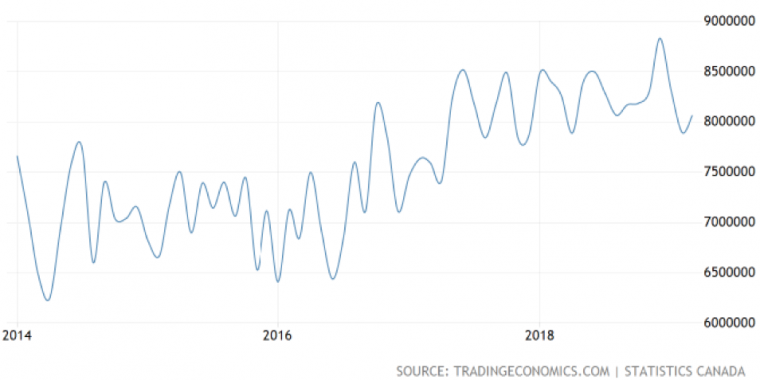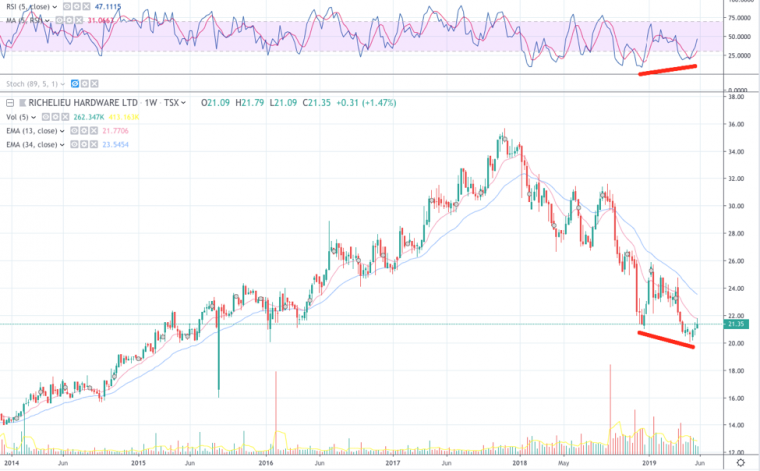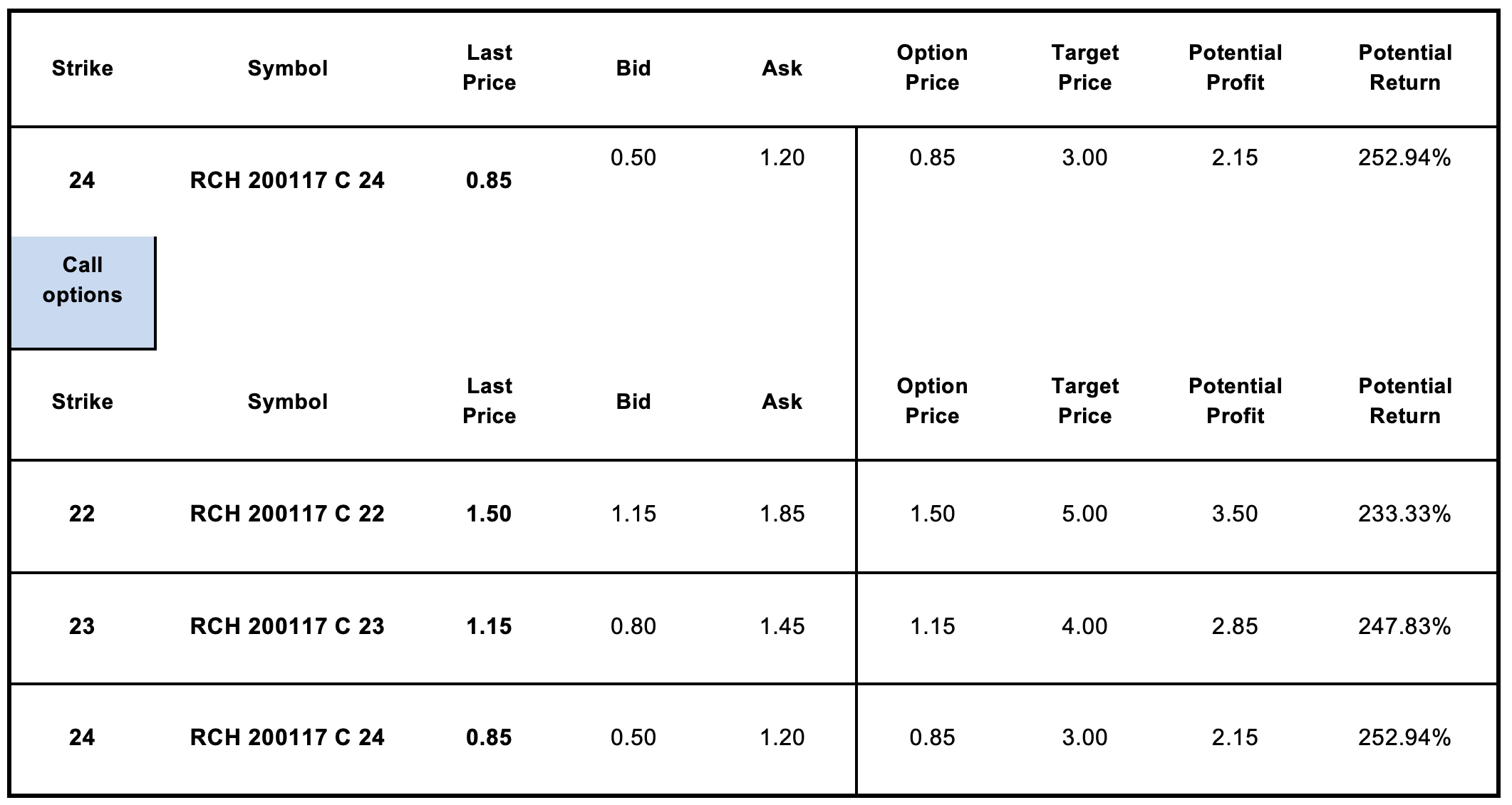Profit from an Increase in Canadian Building Permits

In this article, we analyze changes in Canadian building permits in relation to fluctuations in the price of Richelieu Hardware Ltd. (symbol: RCH) for the period from January 2014 to May 2019. RCH is an importer, distributor and manufacturer of specialty hardware and complementary products. The company’s main source of growth is the residential and commercial renovation market.
Chart 1: Changes in the Value of Canadian Building Permits (as at May 10, 2019)

Chart 2: Weekly Changes in the Price of RCH to May 29, 2019 ($21.35)

Source: Tradingview.com
As the above charts show, from 2014 to early 2016 the value of building permits in Canada fluctuated between $6.5 billion and $7.5 billion, while the price of shares in RCH rose from $14 to $24, for a gain of over 71%. The share price then continued to rise, up another 50% to nearly $36 toward the end of 2018. Meanwhile, the value of building permits began rising, all the way to $8.5 billion.
Starting in 2018, the price of RCH plummeted by more than 38%, to $21.35 on May 29, 2019. This drop, at a time when building permits rose to $8.75 billion and then fell to below $8 billion, seems to indicate that the share price is more of a leading indicator of changes in the value of building permits than the reverse.
So, looking at the recent changes in the price of RCH, we can see that the recent low of close to $20 was not confirmed by a lower trough for the RSI 5 indicator (Relative Strength Index over 5 periods). This positive difference suggests a potential rally in the coming months. If this is indeed what happens, then we should see the value of building permits rise, and this will be a good indication that RCH’s sales will increase.
Such a positive change, if it occurs, may over the next 12 months carry RCH to a target price of $30, representing an increase of more than 40% from $21.35 on May 29, 2019 (important resistance level). An investor who is confident that this scenario will be realized could implement a bullish strategy by purchasing call options to maximize his return per unit of risk.
Since the longest available maturity on May 29, 2019 is January 17, 2020, we will adjust our 8-month target price to $27, representing an increase of approximately 27% (40% x 8 months/12 months). Based on this target price, we will select the call option that will provide the best return if RCH reaches this target at maturity of the option.
We will choose from among the following purchase options:
- RCH 200117 C 22 at $1.50
- RCH 200117 C 23 at $1.15
- RCH 200117 C 24 at $0.85
Position:
Table 1: Comparative Table of Call Options
Option with the best leverage

As the above table shows, of these three available call options it is RCH 200117 C 24 at $0.85 (calculated as the average of the bid and ask prices) that provides the optimal risk/return combination, with a potential return of 253% if RCH reaches the target price of $27.00 on January 17, 2020. Therefore, we will carry out the following transaction:
- Purchase of 10 call options RCH 200117 C 24 at $0.85
- $850 debit
Profit and loss profile
Target price for the call options RCH 200117 C 24 at $0.85 = $3.00 ($27.00 – $24.00)
Potential profit = $2.15 per share ($3.00 – $0.85), for a total of $2,150
Potential loss = $0.85 per share (the premium paid), or $850
Intervention
Even though our target price for RCH shares is $27, our potential profit is linked to the target price of $3.00 for the call options. So we will close out the position as soon as the price of the call options reaches this level, even if RCH has not yet reached the target price of $27. Note that no action will be taken in the event that the stock price goes down instead of up. So it will be important to determine the total capital to be invested in this strategy.
Good luck with your trading, and have a good week!
The strategies presented in this blog are for information and training purposes only, and should not be interpreted as recommendations to buy or sell any security. As always, you should ensure that you are comfortable with the proposed scenarios and ready to assume all the risks before implementing an option strategy.
President
Monetis Financial Corporation
Martin Noël earned an MBA in Financial Services from UQÀM in 2003. That same year, he was awarded the Fellow of the Institute of Canadian Bankers and a Silver Medal for his remarkable efforts in the Professional Banking Program. Martin began his career in the derivatives field in 1983 as an options market maker for options, on the floor at the Montréal Exchange and for various brokerage firms. He later worked as an options specialist and then went on to become an independent trader. In 1996, Mr. Noël joined the Montréal Exchange as the options market manager, a role that saw him contributing to the development of the Canadian options market. In 2001, he helped found the Montréal Exchange’s Derivatives Institute, where he acted as an educational advisor. Since 2005, Martin has been an instructor at UQÀM, teaching a graduate course on derivatives. Since May 2009, he has dedicated himself full-time to his position as the president of CORPORATION FINANCIÈRE MONÉTIS, a professional trading and financial communications firm. Martin regularly assists with issues related to options at the Montréal Exchange.
The information provided on this website, including financial and economic data, quotes and any analysis or interpretation thereof, is provided solely for information purposes and shall not be construed in any jurisdiction as providing any advice or recommendation with respect to the purchase or sale of any derivative instrument, underlying security or any other financial instrument or as providing legal, accounting, tax, financial or investment advice. Bourse de Montréal Inc. recommends that you consult your own advisors in accordance with your needs before making decision to take into account your particular investment objectives, financial situation and individual needs.
All references on this website to specifications, rules and obligations concerning a product are subject to the rules, policies and procedures of Bourse de Montréal Inc. and its clearinghouse, the Canadian Derivatives Clearing Corporation, which prevail over the content of this website. Although care has been taken in the preparation of the documents published on this website, Bourse de Montréal Inc. and/or its affiliates do not guarantee the accuracy or completeness of the information published on this website and reserve the right to amend or review, at any time and without prior notice, the content of these documents. Neither Bourse de Montréal Inc. nor any of its affiliates, directors, officers, employees or agents shall be liable for any damages, losses or costs incurred as a result of any errors or omissions on this website or of the use of or reliance upon any information appearing on this website.
BAX®, CADC®, CGB®, CGF®, CGZ®, LGB®, MX®, OBX®, OGB®, OIS-MX®, ONX®, SCF®, SXA®, SXB®, SXF®, SXH®, SXM®, SXO®, SXY®, and USX® are registered trademarks of the Bourse. OBW™, OBY™, OBZ™, SXK™, SXJ™, SXU™, SXV™, Montréal Exchange and the Montréal Exchange logo are trademarks of the Bourse. All other trademarks used are the property of their respective owners.
© 2024 Bourse de Montréal Inc. All Rights Reserved.
